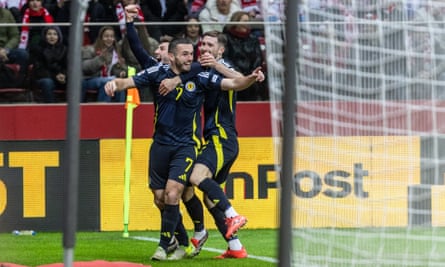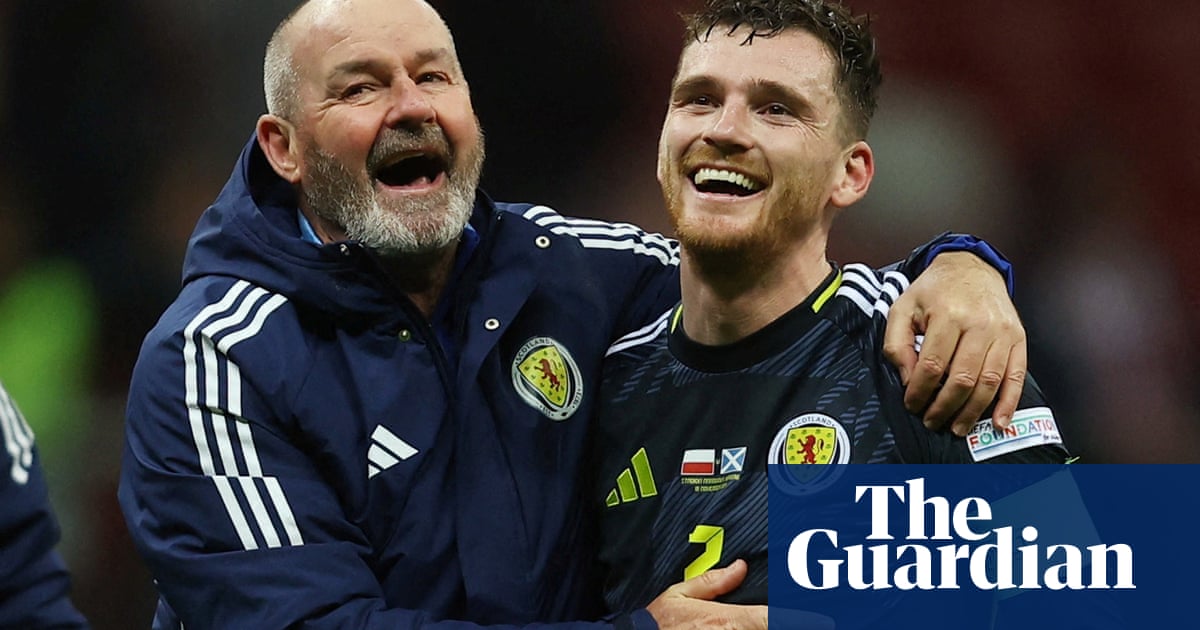Parliamentarians must look enviously at Steve Clarke’s ability to captivate or switch public opinion. Clarke was a national hero when guiding Scotland to Euro 2024. Failure there – or, specifically, the manner of that failure – fuelled a sense Scotland may require a new manager by the start of World Cup qualifying. Three defeats to open the Nations League only emphasised that change was needed.
It was always worth remembering that Clarke had raised expectations in the first place, courtesy of tournament qualifications his predecessors could not achieve despite media love-bombing.
Clarke is the master of all before him once more. Andy Robertson’s finest moment in a Scotland shirt, the flying header to see off Poland in Warsaw on Monday, means the side has wholly realistic hopes of remaining in the Nations League’s top tier. Clarke’s aptitude for this role remains obvious; Scotland won with a 41-year-old goalkeeper, Celtic’s backup right back, a centre-half who cannot command a regular game at Norwich and a League One striker. Even when Scotland were on a miserable run it was plain the squad had not lost faith in Clarke.
The scale of collective celebration as Poland’s players sat dejected on the turf reminded us all the Scottish Football Association will have a formidable task replicating what Clarke has created when time is called on his tenure. This is a team that can at least adequately compete with the best, a point that should not be underplayed given Scotland’s modern-day position in world football’s chain of command.
Received wisdom is that Clarke has thrown off the shackles and departed from his pragmatic normality since the summer in Germany. The answer to the upturn feels more straightforward; key players have rediscovered their form. When those individuals perform, pressure is eased considerably on others.
Scott McTominay and Billy Gilmour have been rejuvenated by moves to Napoli. John McGinn looked back to his best in this international window. John Souttar, who failed to make the plane to the Euros, has since been immense at centre-back. Robertson has played like a man with a point to prove.
Ben Doak’s arrival on the scene has also proved a huge boost; the 19-year-old could yet become the difference-making attacker Scotland have been crying out for. He still has much to learn but excitement attached to him is valid.
Fortune has also started to favour Clarke once again. As Che Adams was denied a late equaliser in Zagreb last month it felt as if Scotland could not catch a break. When Poland won in Glasgow, it was courtesy of a 97th-minute penalty. Fast forward to November; Croatia played the second half at Hampden Park with 10 men and Poland could not call upon the injured Robert Lewandowski. Such was the wonderfully chaotic nature of Monday’s game; it felt a safe bet Lewandowski would have added to Poland’s single goal.
Scotland’s lack of top talent at centre-forward is viewed as the elephant in the room. Lyndon Dykes, who has generally been a revelation for Clarke, has failed to find his scoring touch at Birmingham. Tommy Conway remains untried at international level. Lawrence Shankland has gone from the Scottish domestic scene’s most potent striker – when, pertinently, no other club wanted to buy him – to haplessly blunt in a matter of months. Adams is Clarke’s most technically able in this position but six goals in 35 outings tells a story.
Scotland do not need a prolific marksman if others can adequately contribute. McGinn’s scoring tally has now reached an excellent 20. McTominay is one short of a dozen. Ryan Christie and Doak will offer scoring threat. Clarke has had to improvise with the attacking makeup of his team and has done so perfectly well.
skip past newsletter promotionSign up to Football Daily
Kick off your evenings with the Guardian's take on the world of football
after newsletter promotion
 View image in fullscreen
View image in fullscreen
One point of intrigue will come when Kieran Tierney recovers from injury. A back three (or five) was introduced primarily as a means to play Tierney and Robertson in the same team. The recent switch to a back four has looked far more effective, partly because it allows the talent in midfield to be appropriately deployed. It feels inconceivable Tierney would not start for his country if available. Likewise, it is difficult to know where he would fit in.
If this is a dilemma by the time Scotland return for a Nations League playoff in March, it is one Clarke will welcome. Whoever the opposition, Scotland will have at least a strong chance of remaining in League A.
As the Tartan Army shuffled out of the Stuttgart Arena in June, collectively angered by Scotland’s timid approach to taking on Hungary, this kind of position was inconceivable. But it was always wise to keep faith with Clarke. A manager who has raised the bar for Scotland’s international side had earned that right. The upbeat mood music now sounds familiar.
∎